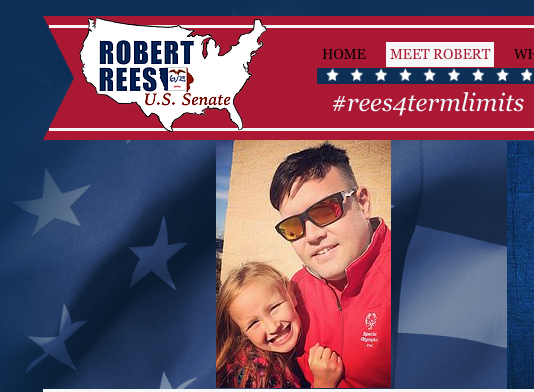Catching up on news from the busy final weeks before the Iowa caucuses, U.S. Senator Chuck Grassley has a rival for the GOP nomination. Robert Rees launched his campaign on January 18, pledging to support term limits for members of Congress and the 10th Amendment, which reserves for the states powers not delegated to the federal government. Rees most recently worked as a conservative talk radio host but fell victim to a format change in October, when 98.3 FM in Des Moines switched to classic hip hop. Rees has a campaign website and is on Twitter, Facebook, and LinkedIn. He frequently uploads “campaign diaries” and other videos to his YouTube channel.
After the jump I’ve posted background on Rees, some of his answers to frequently asked questions about his challenge to Grassley, and his introductory video, in which he notes that Grassley has been in Washington, DC since a year before Rees was born. I’ve also enclosed excerpts from two articles linked on the Rees campaign website. Among other things, those pieces criticize Grassley for approving too many judges nominated by President Barack Obama–which is comical, since during Grassley’s first year as chair of the Senate Judiciary Committee, the Senate confirmed only eleven federal judges, “the fewest in a single year since 1960.”
I can’t conceive of any scenario in which Grassley loses a Republican primary, but assuming Rees qualifies for the ballot, it will be interesting to see how many conservatives cast protest votes for him. For reference, Tom Hoefling got just under 17 percent of the vote in his 2014 GOP primary challenge to Governor Terry Branstad. Turnout is likely to be very low on June 7, since no other statewide offices are elected this year, and only one of Iowa’s four Congressional districts appears likely to have a competitive GOP primary (Representative David Young is expected to face at least one conservative challenger in IA-03).
Rees had nominating petitions out at some Republican precinct caucuses on February 1. To qualify for the primary ballot, he will need to submit to the Secretary of State’s office by March 18 at least 3,331 signatures (0.5% of the votes cast for Governor Terry Branstad in Iowa’s 2014 general election). In addition, those signatures must be collected in at least ten counties, and for each of those counties, the number of signatures on nominating petitions must equal at least 1 percent of the votes cast for Branstad in the 2014 general election.
A few conservatives made noise about a primary challenge to Grassley in 2009, when it appeared he might support some version of health care reform, but they never followed through. Iowa’s senior senator defused some anger on his right flank by warning that end-of-life counseling provisions in the proposed bill could let people “pull the plug on grandma,” though he had voted for a previous law including such counseling. He later voted against the Affordable Care Act in committee and on the Senate floor, while seeking credit for some of its provisions.
Continue Reading...


